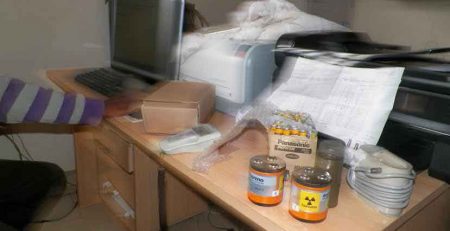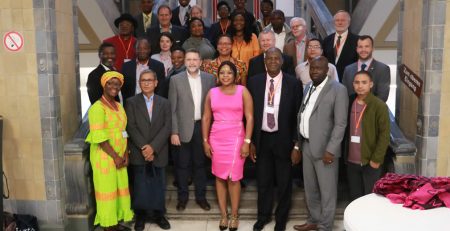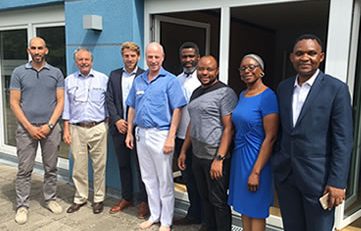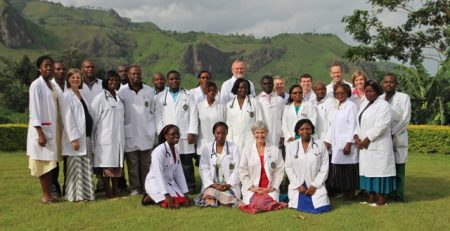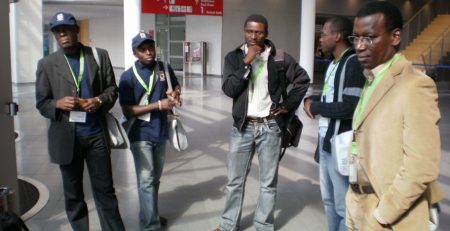Empowering Radiotherapy Cancer Care in Africa
MedphidA e.V.: Empowering radiotherapy cancer care in Africa
Meanwhile the global response to malaria, tuberculosis, HIV and AIDS has led to the creation of institutions such as the Global Fund to Fight AIDS, Tuberculosis and Malaria, cancer continues to claim even more lives worldwide, especially in developing countries where the local cancer control programs are paying little or no attention to radiation oncology. Radiation therapy provides an effective method of cancer therapy and is predicted to be required by more than 50-60% of cancer patients. Until date, there is lack of radiation therapy resources in 31 out of 54 African countries1. The role of radiotherapy must hereby be highlighted, as it may serve either as a stand-alone option for treatment or as adjuvant/neoadjuvant therapy to surgery and chemotherapy to improve on cancer control effectiveness.
In a recent report2, low-income and middle-income countries were reported to possess only about 5% of necessary worldwide oncology resources, whereas they contribute up to 80% of the global cancer burden. From the United Nations Development Program (UNDP) Human Development Report 20153, Cameroon for instance with a human development index (HDI) of 0.51 is rank 153 out of 188, and is listed as a low HDI country. The HDI provides a measure of the socioeconomic development, weighted via the education, life expectancy and income level of a country. The profiles of cancer occurrence and mortality correlate with the country’s HDI. According to the 2012 data analysis for low HDI countries, the five most prevailing cancer types with estimated contributions were breast (17%), cervix uteri (12%), liver (5%), prostate (4.5%) and oesophagus (4%). Conversely, the cancer occurrence ranking in high HDI countries list approximated in order of prevalence; lung (12.5%), breast (12.5%), colorectum (9.1%), prostate (8%), stomach (7%). These trends are coupled with the life expectancy and prevalence of screening tests such as the PSA (prostate specific antigen) test. Genetic predisposition may also interplay as a risk factor. For instance, communities with predominant black population, who are naturally prone to vitamin D deficiency, have been shown to have an increased prostate cancer occurrence. Other influential risk factors for increased cancer occurrence include reproductive patterns (unprotected sexual intercourse correlates with cervix cancer incidence), tobacco consumption (lung, head and neck cancer), and nutritional factors (unhealthy diet, sedentary lifestyle and obesity, associated with colorectal, breast and possibly prostate cancer).
There is a large-scale deficit in medical physics services, diagnostic and therapy resources, and even if available, skilled and qualified personnel are required to provide high quality service. Furthermore, financial as well as logistical issues pose serious hurdles with regards to the acquisition, maintenance and sustainability of modern diagnostic and therapy technology devices. One must mention other critical issues requiring attention such as the so-called brain-drain of nationals who seek more lucrative occupations abroad, electric power fall-outs which may compromise the treatment equipment’s reliability, its quality and delivery efficiency, as well as the necessity for committed leadership to achieve long-term success in cancer control. Considering the diversity in traditional beliefs, cultural and religious backgrounds as well as the stigma associated with cancer, there is the need to educate communities on basic life-style and behavioral patterns which may significantly reduce cancer occurrence, improve on quality of lives and on the long term lead to an economic benefit. The interplay of all these aspects requires a platform whereby all string-pullers may meet a common agreement.
This emergency situation at hand needs to be tackled by taking into consideration the local socioeconomic, political and cultural climate of each country. Bridging the current gap thereby requires a joint effort, not only of radiation oncology and health care experts, but also of industrial partners, educational organizations, philanthropists and health carepolicy makers. For instance, the annually held Global Health Catalyst (GHC) Summit4 at the Dana Faber cancer center in Boston pioneered by Prof. Wilfred Ngwa has made a huge step towards tackling the cancer deficiency issue in Africa by bringing together cancer care stakeholders to work together on global health in radiation oncology with focus on underserved regions. The vision is to one day eradicate cancer, and the approach entails fostering collaborative initiatives via networking and partnerships/mentoring, the use of information and communication technology (ICT) or low-cost technology to mitigate training and education costs, advocacy from patriates in the diaspora for knowledge transfer, as well as to promote education and training. Such initiatives may lower the cost of state-of-the-art cancer treatment, for example with radiotherapy, thereby increasing its access.
MephidA e.V which stands for Medical physicists in diaspora for Africa is a non-profit organisation (NPO) which shares the visions outlined under the GHC summit. MephidA e.V. is based in Germany and is implementing a new kind of wisdom culture in the fight of cancer care in Africa. Several clinics have profited from the activites of MephidA e.V and the resonance from beneficiaries and donators has since then been very encouraging, which has called the attention of even many more organizations and individuals of diverse professions, all sharing the ideal of fostering cancer care in Africa. While disseminating tasks and encouraging advocacy, the association takes advantage not only of networking, but also utilizes the know-how and manpower primarily from the expertise of members such as the certified medical physicist, medical doctors , jonalists, IT-specialists, education and health administrators. MephidA e.V. recently played a major role in fostering this ideal by acting as co-organizer of the 2016 GHC Summit. Furthermore, the organisation is currently working together with the Mbingo Baptist Hospital (MBH), located in the north-west province of Cameroon, to assist in their on-going project of establishing a comprehensive reference cancer care center. The project seeks in the long term to (i) establish a cancer epidemiology registry in the region, (ii) encourage partnership (screening, provide clinical trials, international collaboration), (iii) conduct and support research, training, and other programs with respect to the cause, diagnosis, prevention, and treatment of cancer, rehabilitation from cancer and (iv) establish a secondary standard dosimetry laboratory (SSDL). As mentioned above, finance, human resources and sustainability are usually the main hurdles, which is why MephidA e.V. is working together with its international partners on innovative fund raising mechanism to help MBH with the project.
We must highlight the role of MephidA e.V. in achieving these goals for the MBH and Africa on a large-scale. The vision of the organisation encompasses5 (i) coordinating, encouraging and extending network and voluntary mentorship services to medical physicists, hospitals and universities in Africa from experienced medical physicists around the world, (ii) organizing donations of radiation equipment to clinics and teaching hospitals in Africa, (iii) disseminating and providing factual information through public seminars, workshops and roundtable meetings, (iv) linking radiation oncology professionals and students in Africa and in the diaspora, (v) consulting regarding medical equipment purchase, planning, construction of radiation shielding buildings and radiation protection, (vi) creating awareness and advancement of Medical Physics in Africa by encouraging and collaborating in oncology-related research projects and peer-reviewed publications, (vii) to encourage, sustain and support the mission and activities of WHO, IAEA, IOMP, AAPM, DGMP and FAMPO, (viii) to provide and help cancer patients with accurate information.
Analysis shows that the cancer occurrence and mortality rates in low HDI countries would sink drastically if similar attention is paid to cancer as is the case with HIV AIDS, tuberculosis and malaria. We hereby encourage associations and philanthropists with similar objectives towards promoting cancer awareness and the quest for solutions on more accessible and affordable cancer therapy in Africa, to join us in this quest towards bridging the gap (http://mephida.org/get-in-touch/).
References
1) Abdel-Wahab M. et al 2013 “Status of radiotherapy resources in Africa: an International Atomic Energy Agency analysis” Lancet Oncol 2013; 14: e168–75
2) Atun R. et al 2015 “Expanding global access to radiotherapy” Lancet Oncol 2015; 16: 1153–86
3) Human Development Report 2014. „Sustaining Human Progress: Reducing vulnerabilities and Building Resilience“. UNDP
4) www.globalhealthcatalystevents.org
5) http://mephida.org/about-us/


